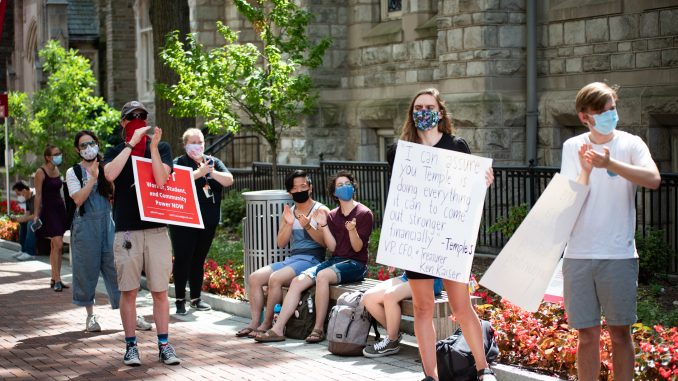
For some students, Temple University’s Aug. 30 announcement that in-person classes would be “paused” for two weeks due to a spike in COVID-19 cases was a disappointment.
For campus organizations that spent weeks or months calling on the university to close entirely, the announcement is a cause for relief, but not celebration.
“Insomuch as the university has started in the direction towards going online, we think they’ve made the right call, and we appreciate that,” said Steve Newman, president of the Temple Association of University Professionals, the union representing around 2700 faculty members.
Newman said, however, that he did not view the decision as a victory, citing the disruption it will cause for students and faculty and the number of cases already confirmed on campus. As of Sept. 2, Temple reported 212 active COVID-19 cases among students.
“We’re not in a celebratory mood,” Newman said.
The union had called for the university to close campus entirely in late July after a decisive vote by its membership.
Daisy Confoy, a senior political science major and co-founder of Defund TUPD, a group advocating for the disbanding of Temple’s police force that also called for the closure of campus, echoed Newman’s reservations.
“This is not a success,” Confoy said. “Temple put the lives of students, faculty and community members at risk for far too long. Even if it was just a week of classes, we knew what was coming, we knew what was the right thing to do.”
Confoy was critical of the university’s decision to suspend classes for two weeks rather than cancelling them for the remainder of the semester.
“I personally think that by saying, ‘We’ll revisit this in another two weeks,’ Temple is saying, ‘We want to keep you on the hook for tuition money,’” she said.
Ray Betzner, a spokesperson for the university, said the suspension was set to last two weeks because it represents the standard quarantine period for those exposed to COVID-19.
“It’s the same period of time that [University of] Notre Dame went on, right, and did their pause, and they’re coming back to the classroom this week,” Betzner said. “So, it’s not an uncommon kind of action.”
The final day to add or drop a full, 16-week class without penalty is Sept. 8 and the due date for tuition and fees is Sept. 10.
With a final decision on the fate of the school’s hybrid learning model potentially pushed to Sept. 11, both deadlines could pass without students knowing whether or not they’ll be on campus through November, said Teresa Swartley, a senior political science major and co-founder of the Student Coalition For Change.
Still, she said the coalition was glad the decision to suspend classes had been made.
“We think it’s good that the university is listening and taking reactive steps. You wish they would have acted proactively, but they haven’t,” Swartley said. “And so now we’re just trying to figure out where to go next.”
Black and Brown Coalition PHL, a citywide organization formed in the wake of the ongoing unrest over police violence and systemic racism, joined both Defund TUPD and the SCFC in calling for the campus to close.
Maheen Shafi, a senior neuroscience major at Temple who serves as a student liaison to the organization, compared the university’s hybrid learning plan to gentrification.
“They’re bringing something that the community cannot protect themselves from, and then not providing them with resources to deal with it,” Shafi said.
Temple’s reopening has so far included testing hundreds of students on campus during move-in, hiring student health ambassadors to encourage social distancing and requiring students to wear masks indoors, The Temple News reported.
While on campus test sites have not been opened to community members, Betzner noted that the university has provided testing to North Philadelphia residents through Temple University Hospital for much of the pandemic.
Newman hopes the university could do better at working with students, faculty, and other stakeholders in the future, he said.
“What we wish is that there would be some way to rebuild trust, so that when we face crises like these, all of the parties involved feel they’re being listened to, and really honored and respected,” Newman said. “So that the decisions that are arrived at make more sense to everybody.”
CORRECTION: A previous version of this article incorrectly stated the number of faculty members TAUP represents.


Be the first to comment